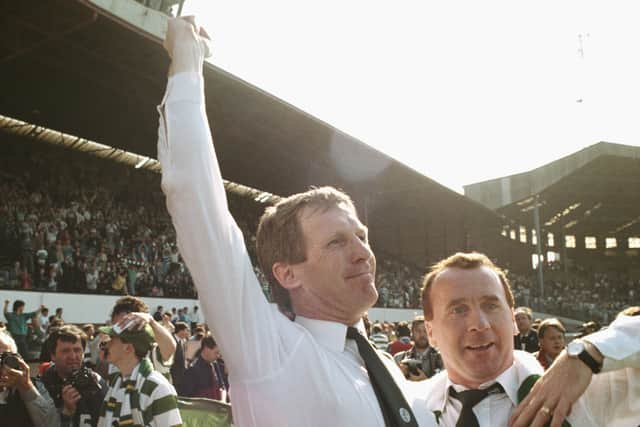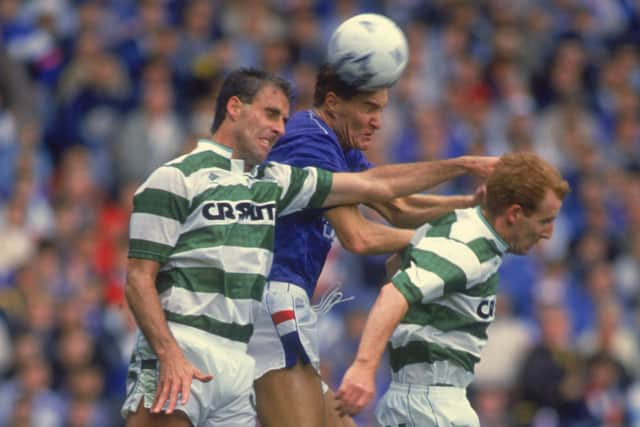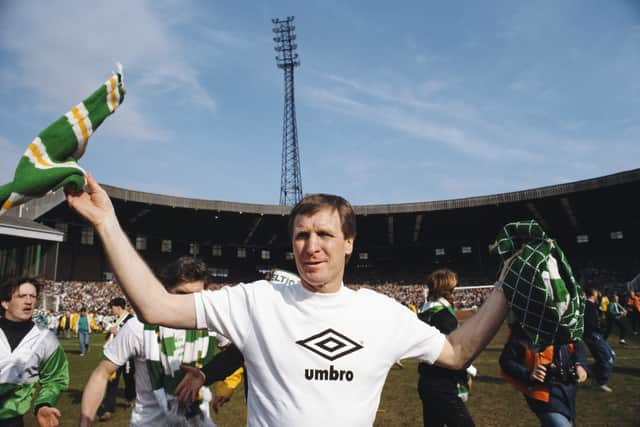Football Flashback: Celtic’s momentous centenary 1987/88 season under Billy McNeill
and live on Freeview channel 276
Billy McNeill’s long association with Celtic spanned more than 60 years as captain of the Lisbon Lions, a successful spell as manager and in later years as a club ambassador.
Nicknamed ‘Cesar’ after the actor Cesar Romero, the former defender still holds the record for most appearances for the Hoops (822 games over 18 seasons). Not only did McNeill skipper the Parkhead club through their most successful era in the 1960s and 70s, he took charge for nine seasons across two seperate spells, with his first stint yielding three league championship titles, a Scottish Cup and a League Cup triumph between 1978-1983.
Advertisement
Hide AdAdvertisement
Hide AdHowever, by 1987 McNeill’s stock had dropped somewhat alarmingly after an ill-fated spell at Aston Villa. He was out of work and facing an uncertain future. At the time, Celtic found themselves in a state of dissary following a trophyless 1986/87 campaign. The club decided to part company with David Hay at the end of May.


Then came a privately arranged car park rendezvous between McNeill and chairman Jack McGinn in Clydebank that summer - 20 years on from the club’s famous European Cup win. The pair discussed whether McNeill would be interested in returning if the job became available and McGinn receieved a positive response. But ‘Cesar’ knew the task of bridging the gap on Graeme Souness’ Rangers squad would be far from straightforward on the back of a dissapointing season for both manager and club.
Summer of change
A high turnover of players would follow, with the likes of Mo Johnston, Murdo MacLeod, Brian McClair and Alan McInally all departing. Club legend Danny McGrain left on a free transfer and Davie Provan was forced to retire due to ill health. McNeill started his recruitment drive but the early signings failed to set pulses racing.
Striker Andy Walker arrived from Motherwell and Billy Stark joined from Aberdeen, which heralded the start of a new era. A pre-season tour of Scandinavia also acted an ideal bonding period for the squad which was packed full of experienced players.
Advertisement
Hide AdAdvertisement
Hide AdRoy Aitken and Paul McStay were regularly involved with Scotland, while Pat Bonner, Chris Morris and Mick McCarthy made up the Republic of Ireland contingent. Add in the likes of Tommy Burns, Peter Grant and Mark McGhee to the mix, it was clear that McNeill and assistant Tommy Craig had plenty of leaders at their disposal as the new season loomed.
Positive signs & McAvennie arrival
A 4-0 victory over Greenock Morton at Cappielow coupled with home wins over Hearts and Motherwell offered early signs of encouragment. Inevitably, Old Firm derbies against Rangers would prove key clashes and a narrow 1-0 win over their rivals, during which Stark netted the match-winner and would later be on the receiving end of a rash Souness tackle that saw the Gers manager sent off, made up for a shock defeat to Dunfermline and continued a strong start to their league campaign.


As the season progressed, attackers Joe Miller and Frank McAvennie were added to the squad after Celtic beat off interest from a number of English clubs, with the latter completing a £750,000 move from West Ham United. McAvennie would go on to form a lethal strike partnership with summer addition Walker and both players’ impact would lay the foundations towards a League and Cup double.
September proved a dissapointing month, with Celtic exiting the League Cup at the quarter-final stage to Aberdeen before crashing out of the UEFA Cup at the hands of Borussia Dortmund after a 3-2 aggregate loss.
Derby delight & unbeaten run
Advertisement
Hide AdAdvertisement
Hide AdThings were rarely dull with McAvennie and he was at the centre of the controversial 2-2 draw at Ibrox in October, during which three players were shown red cards and four men would end up in court. However, the Hoops league form over the next six months left Rangers, Hearts and Aberdeen playing catch up. A 36-match unbeaten run, comprising 21 wins and five draws ensured McNeill’s men had one hand on the trophy.
During that period, McAvennie starred in season-defining victories over Aberdeen and Hibernian, the club secured their first win at Tannadice over Dundee United since October 1984 and late goals from Walker and McStay rescued a 2-2 draw against Hearts.
The New Year derby showdown at Parkhead was settled by a McAvennie brace and two months later McStay and Walker were on the scoresheet again in a gritty 2-1 success to provide the most satisfcation for supporters.
Celtic also embarked on a Scottish Cup run from January onwards and the character of McNeill’s side was illustrated perfectly during the semi-final win over Hearts. Celtic trailed 1-0 with two minutes remainng and their double dream appeared in tatters. That was until McGhee requalised and Walker struck an injury-time winner to send thousands of fans into ecstasy.
Advertisement
Hide AdAdvertisement
Hide AdThe Jambos gained some revenge the following week on league busness, but a 3-0 triumph over Dundee clinched the title in front of a 60,800 crowd. McNeill admitted: “It’s just too much to take it all in. When you’ve been sacked as I have, it’s marvellous to come back and win something like this. I’m indebted to all of them (the players) for making my life come good again.”
Scottish Cup Final
More silverware was to follow. A Scottish Cup final meeting with Dundee United at the national stadium was played out in glorious sunshine in Mount Florida. Following a goalless first-half, questions were again being asked of McNeill’s side after they fell behind to a Kevin Gallacher strike within four minutes of the re-start.
Celtic - without first-choice keeper Bonner due to injury - were fortunate to still be in the tie when Eamonn Bannon passed up two good opportunities to increase the Tangerine’s lead and that proved costly when McAvennie ended his three-month goal drought to equalise before popping up with a last-gasp winner to seal the double.


British prime minister Margaret Thatcher was the guest of honour, which didn’t go down to well with the Celtic supporters as captain Roy Aitken hoisted the trophy aloft. Journalist James Taynor wrote in The Herald: “They (McNeill and Craig) have revived a team which had been in danger of becoming lost in the shadow of Ibrox.”
Advertisement
Hide AdAdvertisement
Hide AdRangers were about to kick-start their domination of Scottish football, but McNeill had achieved something that seemed unthinkable at the beginning of the club’s centenary season. Come May 14, 1988, Celtic fans must have been incredibly thankful for that chance car park meeting in Clydebank.
1987/88 Celtic squad
Goalkeepers - Pat Bonner, Allen McKnight
Defenders - Roy Aitken, Lex Baillie, Stuart Balmer, Mick McCarthy, Paul McGugan, Chris Morris, Anton Rogan, Derek Whyte
Midfielders - Tommy Burns, Peter Grant, Paul McStay, Steven Murray, Tony Shepherd, Billy Stark, Owen Archdeacon
Forwards - Frank McAvennie, Dugald McCarrison, Mark McGhee, Dougie McGuire, Joe Miller, Andy Walker
Comment Guidelines
National World encourages reader discussion on our stories. User feedback, insights and back-and-forth exchanges add a rich layer of context to reporting. Please review our Community Guidelines before commenting.
